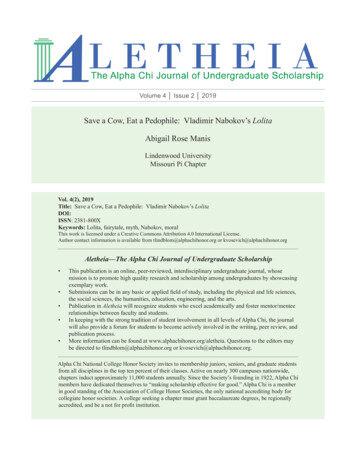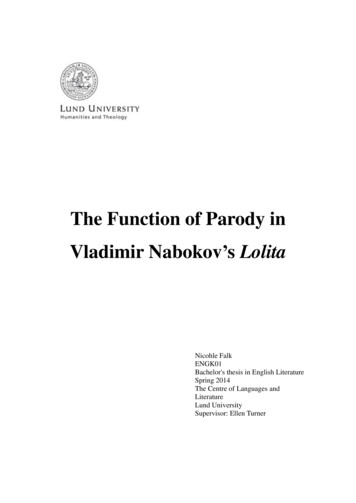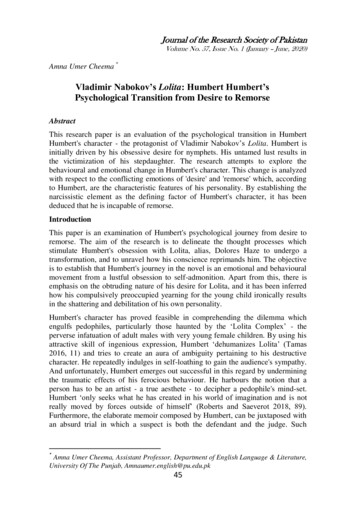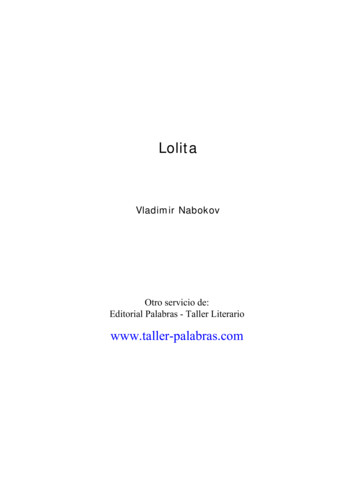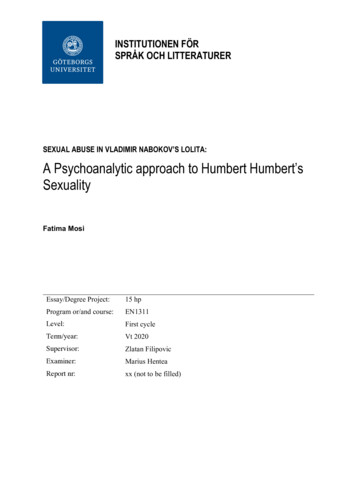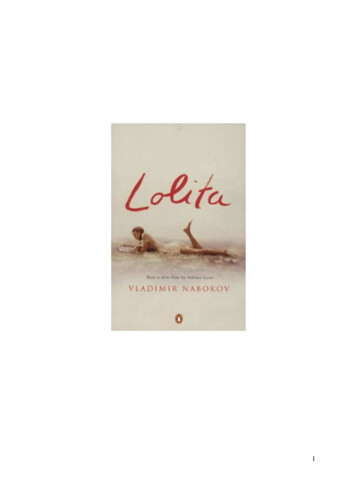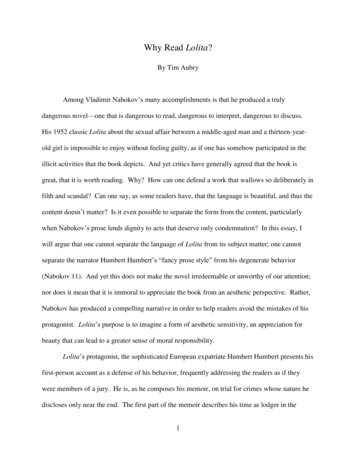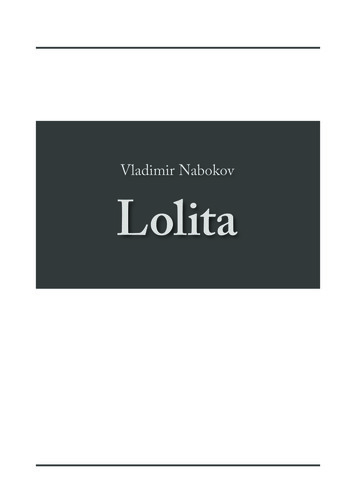
Transcription
Vladimir NabokovLolita
Vladimir NabokovLolitato Véra
2Lolita —Vladimir NabokovContentsForeword 3Part One 5Part Two95Vladimir Nabokov — On a book entitled Lolita207
Vladimir Nabokov — Lolita3Foreword“Lolita, or the Confession of a White Widowed Male,” such were the two titles under whichthe writer of the present note received the strange pages it preambulates. “Humbert Humbert,” their author, had died in legal captivity, of coronary thrombosis, on November 16,1952, a few days before his trial was scheduled to start. His lawyer, my good friend and relation, Clarence Choate Clark, Esq., now of he District of Columbia bar, in asking me to editthe manuscript, based his request on a clause in his client’s will which empowered my eminent cousin to use his discretion in all matters pertaining to the preparation of “Lolita” forprint. Mr. Clark’s decision may have been influenced by the fact that the editor of his choicehad just been awarded the Poling Prize for a modest work (“Do the Senses make Sense?”)wherein certain morbid states and perversions had been discussed.My task proved simpler than either of us had anticipated. Save for the correction of obvious solecisms and a careful suppression of a few tenacious details that despite “H.H.”’s ownefforts still subsisted in his text as signposts and tombstones (indicative of places or personsthat taste would conceal and compassion spare), this remarkable memoir is presented intact.Its author’s bizarre cognomen is his own invention; and, of course, this mask — through whichtwo hypnotic eyes seem to glow — had to remain unlifted in accordance with its wearer’swish. While “Haze” only rhymes with the heroine’s real surname, her first name is too closelyinterwound with the inmost fiber of the book to allow one to alter it; nor (as the reader willperceive for himself ) is there any practical necessity to do so. References to “H.H.”’s crimemay be looked up by the inquisitive in the daily papers for September-October 1952; its causeand purpose would have continued to come under my reading lamp.For the benefit of old-fashioned readers who wish to follow the destinies of the “real” people beyond the “true” story, a few details may be given as received from Mr. “Windmuller,”of “Ramsdale,” who desires his identity suppressed so that “the long shadow of this sorry andsordid business” should not reach the community to which he is proud to belong. His daughter, “Louise,” is by now a college sophomore, “Mona Dahl” is a student in Paris. “Rita” hasrecently married the proprietor of a hotel in Florida. Mrs. “Richard F. Schiller” died inchildbed, giving birth to a stillborn girl, on Christmas Day 1952, in Gray Star, a settlement
4Lolita —Vladimir Nabokovin the remotest Northwest. “Vivian Darkbloom” has written a biography, “My Cue,” to bepublished shortly, and critics who have perused the manuscript call it her best book. The caretakers of the various cemeteries involved report that no ghosts walk.Viewed simply as a novel, “Lolita” deals with situations and emotions that would remainexasperatingly vague to the reader had their expression been etiolated by means of platitudinous evasions. True, not a single obscene term is to be found in the whole work; indeed, the robust philistine who is conditioned by modern conventions into accepting without qualmsa lavish array of four-letter words in a banal novel, will be quite shocked by their absencehere. If, however, for this paradoxical prude’s comfort, an editor attempted to dilute or omitscenes that a certain type of mind might call “aphrodisiac” (see in this respect the monumentaldecision rendered December 6, 1933, by Hon. John M. Woolsey in regard to another, considerably more outspoken, book), one would have to forego the publication of “Lolita” altogether,since those very scenes that one might ineptly accuse of sensuous existence of their own, arethe most strictly functional ones in the development of a tragic tale tending unswervingly tonothing less than a moral apotheosis. The cynic may say that commercial pornography makesthe same claim; the learned may counter by asserting that “H.H.”’s impassioned confessionis a tempest in a test tube; that at least 12% of American adult males — a “conservative” estimate according to Dr. Blanche Schwarzmann (verbal communication) — enjoy yearly, inone way or another, the special experience “H.H.” describes with such despair; that had ourdemented diarist gone, in the fatal summer of 1947, to a competent psycho-pathologist, therewould have been no disaster; but then, neither would there have been this book.This commentator may be excused for repeating what he has stressed in his own books andlectures, namely that “offensive” is frequently but a synonym for “unusual;” and a great work ofart is of course always original, and thus by its very nature should come as a more or less shocking surprise. I have no intention to glorify “H.H.” No doubt, he is horrible, he is abject, he isa shining example of moral leprosy, a mixture of ferocity and jocularity that betrays suprememisery perhaps, but is not conducive to attractiveness. He is ponderously capricious. Many of hiscasual opinions on the people and scenery of this country are ludicrous. A desperate honesty thatthrobs through his confession does not absolve him from sins of diabolical cunning. He is abnormal. He is not a gentleman. But how magically his singing violin can conjure up a tendresse,a compassion for Lolita that makes us entranced with the book while abhorring its author!As a case history, “Lolita” will become, no doubt, a classic in psychiatric circles. As a workof art, it transcends its expiatory aspects; and still more important to us than scientific significance and literary worth, is the ethical impact the book should have on the serious reader;for in this poignant personal study there lurks a general lesson; the wayward child, the egotistic mother, the panting maniac — these are not only vivid characters in a unique story:they warn us of dangerous trends; they point out potent evils. “Lolita” should make all ofus — parents, social workers, educators — apply ourselves with still greater vigilance and vision to the task of bringing up a better generation in a safer world.Widworth, Mass.August 5, 1955John Ray, Jr., Ph.D.
Vladimir Nabokov — Lolita5Part One1Lolita, light of my life, fire of my loins. My sin, my soul. Lo-lee-ta: the tip ofthe tongue taking a trip of three steps down the palate to tap, at three, on the teeth.Lo. Lee. Ta.She was Lo, plain Lo, in the morning, standing four feet ten in one sock. She wasLola in slacks. She was Dolly at school. She was Dolores on the dotted line. But inmy arms she was always Lolita.Did she have a precursor? She did, indeed she did. In point of fact, theremight have been no Lolita at all had I not loved, one summer, a certain initialgirl-child. In a princedom by the sea. Oh when? About as many years before Lolita was born as my age was that summer. You can always count on a murderer fora fancy prose style.Ladies and gentlemen of the jury, exhibit number one is what the seraphs, the misinformed, simple, noble-winged seraphs, envied. Look at this tangle of thorns.2I was born in 9 0, in Paris. My father was a gentle, easy-going person, a salad ofracial genes: a Swiss citizen, of mixed French and Austrian descent, with a dash ofthe Danube in his veins. I am going to pass around in a minute some lovely, glossyblue picture-postcards. He owned a luxurious hotel on the Riviera. His father and twograndfathers had sold wine, jewels and silk, respectively. At thirty he married an English girl, daughter of Jerome Dunn, the alpinist, and granddaughter of two Dorset parsons, experts in obscure subjects — paleopedology and Aeolian harps, respectively. My
6Lolita —Vladimir Nabokovvery photogenic mother died in a freak accident (picnic, lightning) when I was three,and, save for a pocket of warmth in the darkest past, nothing of her subsists withinthe hollows and dells of memory, over which, if you can still stand my style (I amwriting under observation), the sun of my infancy had set: surely, you all know thoseredolent remnants of day suspended, with the midges, about some hedge in bloom orsuddenly entered and traversed by the rambler, at the bottom of a hill, in the summerdusk; a furry warmth, golden midges.My mother’s elder sister, Sybil, whom a cousin of my father’s had married and thenneglected, served in my immediate family as a kind of unpaid governess and housekeeper. Somebody told me later that she had been in love with my father, and that hehad lightheartedly taken advantage of it one rainy day and forgotten it by the timethe weather cleared. I was extremely fond of her, despite the rigidity — the fatal rigidity — of some of her rules. Perhaps she wanted to make of me, in the fullness oftime, a better widower than my father. Aunt Sybil had pink-rimmed azure eyes anda waxen complexion. She wrote poetry. She was poetically superstitious. She said sheknew she would die soon after my sixteenth birthday, and did. Her husband, a greattraveler in perfumes, spent most of his time in America, where eventually he foundeda firm and acquired a bit of real estate.I grew, a happy, healthy child in a bright would of illustrated books, clean sand, orange trees, friendly dogs, sea vistas and smiling faces. Around me the splendid HotelMirana revolved as a kind of private universe, a whitewashed cosmos within the bluegreater one that blazed outside. From the aproned pot-scrubber to the flanneled potentate, everybody liked me, everybody petted me. Elderly American ladies leaningon their canes listed towards me like towers of Pisa. Ruined Russian princesses whocould not pay my father, bought me expensive bonbons. He, mon cher petit papa, tookme out boating and biking, taught me to swim and dive and water-ski, read to meDon Quixote and Les Misérables, and I adored and respected him and felt glad for himwhenever I overheard the servants discuss his various lady-friends, beautiful and kindbeings who made much of me and cooed and shed precious tears over my cheerfulmotherlessness.I attended an English day school a few miles from home, and there I played rackets and fives, and got excellent marks, and was on perfect terms with schoolmates andteachers alike. The only definite sexual events that I can remember as having occurredbefore my thirteenth birthday (that is, before I first saw my little Annabel) were: a solemn, decorous and purely theoretical talk about pubertal surprises in the rose garden of the school with an American kid, the son of a then celebrated motion-pictureactress whom he seldom saw in the three-dimensional world; and some interestingreactions on the part of my organism to certain photographs, pearl and umbra, withinfinitely soft partings, in Pichon’s sumptuous Le Beauté Humaine that that I hadfilched from under a mountain of marble-bound Graphics in the hotel library. Later,in his delightful debonair manner, my father gave me all the information he thoughtI needed about sex; this was just before sending me, in the autumn of 923, to a lycée
Vladimir Nabokov — Lolita7in Lyon (where we were to spend three winters); but alas, in the summer of that year,he was touring Italy with Mme de R. and her daughter, and I had nobody to complain to, nobody to consult.3Annabel was, like the writer, of mixed parentage: half-English, half-Dutch, in her case.I remember her features far less distinctly today than I did a few years ago, beforeI knew Lolita. There are two kinds of visual memory: one when you skillfully recreatean image in the laboratory of your mind, with your eyes open (and then I see Annabel in such general terms as: “honey-colored skin,” “think arms,” “brown bobbed hair,”“long lashes,” “big bright mouth”); and the other when you instantly evoke, with shuteyes, on the dark inner side of your eyelids, the objective, absolutely optical replica ofa beloved face, a little ghost in natural colors (and this is how I see Lolita).Let me therefore primly limit myself, in describing Annabel, to saying she wasa lovely child a few months my junior. Her parents were old friends of my aunt’s,and as stuffy as she. They had rented a villa not far from Hotel Mirana. Bald brownMr. Leigh and fat, powdered Mrs. Leigh (born Vanessa van Ness). How I loathedthem! At first, Annabel and I talked of peripheral affairs. She kept lifting handfulsof fine sand and letting it pour through her fingers. Our brains were turned the waythose of intelligent European preadolescents were in our day and set, and I doubt ifmuch individual genius should be assigned to our interest in the plurality of inhabited worlds, competitive tennis, infinity, solipsism and so on. The softness and fragilityof baby animals caused us the same intense pain. She wanted to be a nurse in somefamished Asiatic country; I wanted to be a famous spy.All at once we were madly, clumsily, shamelessly, agonizingly in love with eachother; hopelessly, I should add, because that frenzy of mutual possession might havebeen assuaged only by our actually imbibing and assimilating every particle of eachother’s soul and flesh; but there we were, unable even to mate as slum children wouldhave so easily found an opportunity to do. After one wild attempt we made to meetat night in her garden (of which more later), the only privacy we were allowed wasto be out of earshot but not out of sight on the populous part of the plage. There, onthe soft sand, a few feet away from our elders, we would sprawl all morning, in a petrified paroxysm of desire, and take advantage of every blessed quirk in space and timeto touch each other: her hand, half-hidden in the sand, would creep toward me, itsslender brown fingers sleepwalking nearer and nearer; then, her opalescent knee wouldstart on a long cautious journey; sometimes a chance rampart built by younger children granted us sufficient concealment to graze each other’s salty lips; these incomplete contacts drove our healthy and inexperienced young bodies to such a state ofexasperation that not even the cold blue water, under which we still clawed at eachother, could bring relief.
8Lolita —Vladimir NabokovAmong some treasures I lost during the wanderings of my adult years, there wasa snapshot taken by my aunt which showed Annabel, her parents and the staid, elderly, lame gentleman, a Dr. Cooper, who that same summer courted my aunt, groupedaround a table in a sidewalk café. Annabel did not come out well, caught as she was inthe act of bending over her chocolat glacé, and her thin bare shoulders and the partingin her hair were about all that could be identified (as I remember that picture) amidthe sunny blur into which her lost loveliness graded; but I, sitting somewhat apartfrom the rest, came out with a kind of dramatic conspicuousness: a moody, beetlebrowed boy in a dark sport shirt and well-tailored white shorts, his legs crossed, sittingin profile, looking away. That photograph was taken on the last day of our fatal summer and just a few minutes before we made our second and final attempt to thwartfate. Under the flimsiest of pretexts (this was our very last chance, and nothing reallymattered) we escaped from the café to the beach, and found a desolate stretch of sand,and there, in the violet shadow of some red rocks forming a kind of cave, had a briefsession of avid caresses, with somebody’s lost pair of sunglasses for only witness. I wason my knees, and on the point of possessing my darling, when two bearded bathers,the old man of the sea and his brother, came out of the sea with exclamations of ribald encouragement, and four months later she died of typhus in Corfu.4I leaf again and again through these miserable memories, and keep asking myself,was it then, in the glitter of that remote summer, that the rift in my life began; or wasmy excessive desire for that child only the first evidence of an inherent singularity?When I try to analyze my own cravings, motives, actions and so forth, I surrender toa sort of retrospective imagination which feeds the analytic faculty with boundlessalternatives and which causes each visualized route to fork and re-fork without endin the maddeningly complex prospect of my past. I am convinced, however, that ina certain magic and fateful way Lolita began with Annabel.I also know that the shock of Annabel’s death consolidated the frustration of thatnightmare summer, made of it a permanent obstacle to any further romance throughout the cold years of my youth. The spiritual and the physical had been blended inus with a perfection that must remain incomprehensible to the matter-of-fact, crude,standard-brained youngsters of today. Long after her death I felt her thoughts floating through mine. Long before we met we had had the same dreams. We comparednotes. We found strange affinities. The same June of the same year ( 9 9) a stray canary had fluttered into her house and mine, in two widely separated countries. Oh,Lolita, had you loved me thus!I have reserved for the conclusion of my “Annabel” phase the account of our unsuccessful first tryst. One night, she managed to deceive the vicious vigilance of herfamily. In a nervous and slender-leaved mimosa grove at the back of their villa we
Vladimir Nabokov — Lolita9found a perch on the ruins of a low stone wall. Through the darkness and the tendertrees we could see the arabesques of lighted windows which, touched up by the colored inks of sensitive memory, appear to me now like playing cards — presumablybecause a bridge game was keeping the enemy busy. She trembled and twitched asI kissed the corner of her parted lips and the hot lobe of her ear. A cluster of starspalely glowed above us, between the silhouettes of long thin leaves; that vibrant skyseemed as naked as she was under her light frock. I saw her face in the sky, strangelydistinct, as if it emitted a faint radiance of its own. Her legs, her lovely live legs, werenot too close together, and when my hand located what it sought, a dreamy and eerieexpression, half-pleasure, half-pain, came over those childish features. She sat a littlehigher than I, and whenever in her solitary ecstasy she was led to kiss me, her headwould bend with a sleepy, soft, drooping movement that was almost woeful, and herbare knees caught and compressed my wrist, and slackened again; and her quiveringmouth, distorted by the acridity of some mysterious potion, with a sibilant intake ofbreath came near to my face. She would try to relieve the pain of love by first roughlyrubbing her dry lips against mine; then my darling would draw away with a nervoustoss of her hair, and then again come darkly near and let me feed on her open mouth,while with a generosity that was ready to offer her everything, my heart, my throat,my entrails, I have her to hold in her awkward fist the scepter of my passion.I recall the scent of some kind of toilet powder — I believe she stole it from hermother’s Spanish maid — a sweetish, lowly, musky perfume. It mingled with herown biscuity odor, and my senses were suddenly filled to the brim; a sudden commotion in a nearby bush prevented them from overflowing—and as we drew awayfrom each other, and with aching veins attended to what was probably a prowlingcat, there came from the house her mother’s voice calling her, with a rising franticnote — and Dr. Cooper ponderously limped out into the garden. But that mimosagrove — the haze of stars, the tingle, the flame, the honey-dew, and the ache remainedwith me, and that little girl with her seaside limbs and ardent tongue haunted meever since — until at last, twenty-four years later, I broke her spell by incarnating herin another.5The days of my youth, as I look back on them, seem to fly away from me in a flurry ofpale repetitive scraps like those morning snow storms of used tissue paper that a trainpassenger sees whirling in the wake of the observation car. In my sanitary relationswith women I was practical, ironical and brisk. While a college student, in Londonand Paris, paid ladies sufficed me. My studies were meticulous and intense, althoughnot particularly fruitful. At first, I planned to take a degree in psychiatry and manymanqué talents do; but I was even more manqué than that; a peculiar exhaustion, I amso oppressed, doctor, set in; and I switched to English literature, where so many frus-
10Lolita —Vladimir Nabokovtrated poets end as pipe-smoking teachers in tweeds. Paris suited me. I discussed Soviet movies with expatriates. I sat with uranists in the Deux Magots. I published tortuous essays in obscure journals. I composed pastiches: Fräulein von Kulpmay turn, her hand upon the door;I will not follow her. Nor Fresca. Northat Gull.A paper of mine entitled “The Proustian theme in a letter from Keats to BenjaminBailey” was chuckled over by the six or seven scholars who read it. I launched uponan “Histoire abrégée de la poésie anglaise” for a prominent publishing firm, and thenstarted to compile that manual of French literature for English-speaking students(with comparisons drawn from English writers) which was to occupy me throughout the forties — and the last volume of which was almost ready for press by the timeof my arrest.I found a job — teaching English to a group of adults in Auteuil. Then a school forboys employed me for a couple of winters. Now and then I took advantage of the acquaintances I had formed among social workers and psychotherapists to visit in theircompany various institutions, such as orphanages and reform schools, where pale pubescent girls with matted eyelashes could be stared at in perfect impunity remindfulof that granted one in dreams.Now I wish to introduce the following idea. Between the age limits of nine andfourteen there occur maidens who, to certain bewitched travelers, twice or many timesolder than they, reveal their true nature which is not human, but nymphic (that is, demoniac); and these chosen creatures I propose to designate as “nymphets.”It will be marked that I substitute time terms for spatial ones. In fact, I would havethe reader see “nine” and “fourteen” as the boundaries — the mirrory beaches and rosyrocks — of an enchanted island haunted by those nymphets of mine and surrounded bya vast, misty sea. Between those age limits, are all girl-children nymphets? Of coursenot. Otherwise, we who are in the know, we lone voyagers, we nympholepts, wouldhave long gone insane. Neither are good looks any criterion; and vulgarity, or at leastwhat a given community terms so, does not necessarily impair certain mysteriouscharacteristics, the fey grace, the elusive, shifty, soul-shattering, insidious charm thatseparates the nymphet from such coevals of hers as are incomparably more dependenton the spatial world of synchronous phenomena than on that intangible island of entranced time where Lolita plays with her likes. Within the same age limits the number of true nymphets is trickingly inferior to that of provisionally plain, or just nice,or “cute,” or even “sweet” and “attractive,” ordinary, plumpish, formless, cold-skinned,essentially human little girls, with tummies and pigtails, who may or may not turninto adults of great beauty (look at the ugly dumplings in black stockings and whitehats that are metamorphosed into stunning stars of the screen). A normal man given
Vladimir Nabokov — Lolita11a group photograph of school girls or Girl Scouts and asked to point out the comeliest one will not necessarily choose the nymphet among them. You have to be an artist and a madman, a creature of infinite melancholy, with a bubble of hot poison inyour loins and a super-voluptuous flame permanently aglow in your subtle spine (oh,how you have to cringe and hide!), in order to discern at once, by ineffable signs—theslightly feline outline of a cheekbone, the slenderness of a downy limb, and other indices which despair and shame and tears of tenderness forbid me to tabulate — thelittle deadly demon among the wholesome children; she stands unrecognized by themand unconscious herself of her fantastic power.Furthermore, since the idea of time plays such a magic part in the matter, the student should not be surprised to learn that there must be a gap of several years, neverless than ten I should say, generally thirty or forty, and as many as ninety in a fewknown cases, between maiden and man to enable the latter to come under a nymphet’sspell. It is a question of focal adjustment, of a certain distance that the inner eye thrillsto surmount, and a certain contrast that the mind perceives with a gasp of perversedelight. When I was a child and she was a child, my little Annabel was no nymphetto me; I was her equal, a faunlet in my own right, on that same enchanted island oftime; but today, in September 952, after twenty-nine years have elapsed, I think I candistinguish in her the initial fateful elf in my life. We loved each other with a premature love, marked by a fierceness that so often destroys adult lives. I was a strong ladand survived; but the poison was in the wound, and the wound remained ever open,and soon I found myself maturing amid a civilization which allows a man of twentyfive to court a girl of sixteen but not a girl of twelve.No wonder, then, that my adult life during the European period of my existenceproved monstrously twofold. Overtly, I had so-called normal relationships with a number of terrestrial women having pumpkins or pears for breasts; inly, I was consumedby a hell furnace of localized lust for every passing nymphet whom as a law-abidingpoltroon I never dared approach. The human females I was allowed to wield were butpalliative agents. I am ready to believe that the sensations I derived from natural fornication were much the same as those known to normal big males consorting with theirnormal big mates in that routine rhythm which shakes the world. The trouble was thatthose gentlemen had not, and I had, caught glimpses of an incomparably more poignant bliss. The dimmest of my pollutive dreams was a thousand times more dazzlingthan all the adultery the most virile writer of genius or the most talented impotentmight imagine. My world was split. I was aware of not one but two sexes, neither ofwhich was mine; both would be termed female by the anatomist. But to me, throughthe prism of my senses, “they were as different as mist and mast.” All this I rationalize now. In my twenties and early thirties, I did not understand my throes quite soclearly. While my body knew what it craved for, my mind rejected my body’s everyplea. One moment I was ashamed and frightened, another recklessly optimistic. Taboos strangulated me. Psychoanalysts wooed me with pseudoliberations of pseudolibidoes. The fact that to me the only object of amorous tremor were sisters of Annabel’s,
12Lolita —Vladimir Nabokovher handmaids and girl-pages, appeared to me at times as a forerunner of insanity. Atother times I would tell myself that it was all a question of attitude, that there wasreally nothing wrong in being moved to distraction by girl-children. Let me remindmy reader that in England, with the passage of the Children and Young Person Actin 933, the term “girl-child” is defined as “a girl who is over eight but under fourteenyears” (after that, from fourteen to seventeen, the statutory definition is “young person”). In Massachusetts, U.S., on the other hand, a “wayward child” is, technically, one“between seven and seventeen years of age” (who, moreover, habitually associates withvicious or immoral persons). Hugh Broughton, a writer of controversy in the reignof James the First, has proved that Rahab was a harlot at ten years of age. This is allvery interesting, and I daresay you see me already frothing at the mouth in a fit; butno, I am not; I am just winking happy thoughts into a little tiddle cup. Here are somemore pictures. Here is Virgil who could the nymphet sing in a single tone, but probably preferred a lad’s perineum. Here are two of King Akhnaten’s and Queen Nefertiti’s pre-nubile Nile daughters (that royal couple had a litter of six), wearing nothingbut many necklaces of bright beads, relaxed on cushions, intact after three thousandyears, with their soft brown puppybodies, cropped hair and long ebony eyes. Hereare some brides of ten compelled to seat themselves on the fascinum, the virile ivoryin the temples of classical scholarship. Marriage and cohabitation before the age ofpuberty are still not uncommon in certain East Indian provinces. Lepcha old menof eighty copulate with girls of eight, and nobody minds. After all, Dante fell madlyin love with Beatrice when she was nine, a sparkling girleen, painted and lovely, andbejeweled, in a crimson frock, and this was in 274, in Florence, at a private feast inthe merry month of May. And when Petrarch fell madly in love with his Laureen,she was a fair-haired nymphet of twelve running in the wind, in the pollen and dust,a flower in flight, in the beautiful plain as descried from the hills of Vaucluse.But let us be prim and civilized. Humbert Humbert tried hard to be good. Reallyand truly, he id. He had the utmost respect for ordinary children, with their purityand vulnerability, and under no circumstances would he have interfered with the innocence of a child, if there was the least risk of a row. But how his heart beat when,among the innocent throng, he espied a demon child, “enfant charmante et fourbe,” dimeyes, bright lips, ten years in jail if you only show her you are looking at her. So lifewent. Humbert was perfectly capable of intercourse with Eve, but it was Lilith helonged for. The bud-stage of breast development appears early ( 0.7 years) in the sequence of somatic changes accompanying pubescence. And the next maturationalitem available is the first appearance of pigmented pubic hair ( .2 years). My littlecup brims with tiddles.A shipwreck. An atoll. Alone with a drowned passenger’s shivering child. Darling,this is only a ga
Vladimir Nabokov Lolita. Vladimir Nabokov Lolita to Véra
